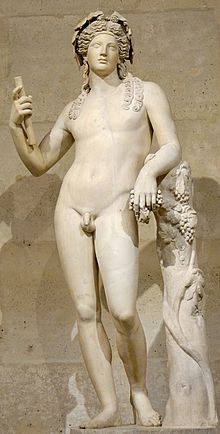Dionysus Greek God of wine, was one of the few gods to be born from a god and mortal. His father was Zeus, and his mother was Semele. He is often given the status of an Olympian god but is also left out of the list.

Dionysus Greek God: Birth
Dionysus mother was Semele, who was a mortal. Zeus fell madly in love with Semele and made love to her, but since he was a god, he could not reveal himself to her in his glory. She did not know with whom she was having relations with, but she knew it was a god, and she knew that she enjoyed it. Once Hera learned of Zeus' infidelity, she visited Semele and tricked her into asking Zeus for one wish, and that was to see his true form. When Zeus arrived to see his mortal love, she asked him for one wish, and he agreed. She then said that she wished to see him. Zeus, knowing that mortals could not look at his glory, was bound by his oath and revealed himself to Semele. She was instantly burnt up, but the baby inside her was saved by Zeus and stitched to his thigh.
When Dionysus was born, Hera sent Titans to kill him, and they succeeded in ripping him apart. Rhea brought him back to life, and afterward, Zeus took him to the mountains and arranged for his protection.
Dionysus Greek God: Wanderer
When Dionysus grew up, he discovered the culture of the vine and the mode of extracting its precious juice, being the first to do so, but Hera struck him with madness and drove him forth as a wanderer through various parts of the earth. Rhea cured him and taught him her religious rites, and he set out on a progress through Asia, teaching the people the cultivation of the vine. The most famous part of his wanderings is his expedition to India, which is said to have lasted several years. According to a legend, when Alexander the Great reached a city called Nysa near the Indus River, the locals said that their city was founded by Dionysus in the distant past, and their city was dedicated to the god Dionysus. These travels took something of the form of military conquests; according to Diodorus Siculus, he conquered the whole world except for Britain and Ethiopia. Returning in triumph, he undertook to introduce his worship into Greece but was opposed by some princes who dreaded its introduction on account of the disorders and madness it brought with it.
Dionysus became one of the most important gods in everyday life and was associated with several key concepts. One was rebirth after death; his dismemberment by the Titans and his return to life was symbolically echoed in viticulture, where the vines must be pruned back sharply and then become dormant in winter for them to bear fruit. Another concept was that under the influence of wine, one could feel possessed by a greater power. Unlike other gods, Dionysus was not merely a god to be worshipped, but he was also present within his followers; at those times, a man would possess supernatural powers and be able to do things he would not be able to do otherwise.
